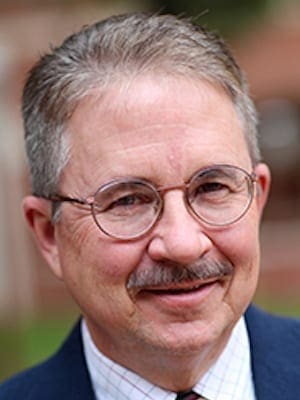I find one of the greatest ironies of contemporary American Christianity here: What usually is called “conservative Christianity” is really a form of liberal Christianity.
So, as usual, it is important to define our terms.
Here, by “conservative Christianity,” I mean that sociopolitical expression of Christianity sometimes called the Religious Right and often given the misnomer “evangelicalism” by the media.
By “liberal Christianity,” I mean that historical-theological type of Christianity noted for accommodating to culture.
Karl Barth and other astute critics of liberal theology, especially liberal Protestant theology, accused it of being “culture Christianity.”
His prime example was liberal Protestant theologian Ernst Troeltsch. He was famous, or infamous, for applying “historicism” fairly radically to all religion, including Christianity.
For Troeltsch, Christianity, like all religion, was a product of history and explainable without reference to anything supernatural. For him, Christianity would someday die away. What would be lost? Well, nothing absolute, but not absolutely nothing!
What did Troeltsch mean?
He argued that there is nothing absolute in history, but also that Christianity, though relative, is the best and highest source of “cultural values” for the reconstruction of European society after World War I.
He elevated Christianity to that status due to its “historical heirlooms” – values for society, for the unity of humanity (by which he meant Europeans).
Troeltsch is usually considered a giant of “classical liberal Protestant theology.”
Here is the great irony I mentioned at the beginning of this essay: As I see it, many U.S. Christians who consider themselves “conservative Christians” and even “evangelicals” adhere to the motto “America first!” and see Christianity primarily as a prop for their Americanism.
They regard Christianity as, to use Troeltsch’s terms, the source of “cultural values” for the defense of “traditional American ways.”
Let me go deeper with these musings. Many of these “conservative American Christians” seem to me very little concerned with traditional, classical Christian doctrines.
To them, so far as I can tell from listening to them, Christianity is not a life and worldview or a set of beliefs, as much as a reservoir of what Troeltsch called “historical heirlooms” that remind them of “the way things used to be” in America.
Of course, there are many differences between Troeltsch’s historicized Christianity and contemporary conservative American Christianity, but one major similarity stands out.
Troeltsch believed that Christianity was of enduring value mainly for “Europaism” – maintaining traditional European civilization in the chaos that threatened Europe after World War I.
As I see it, many contemporary so-called “evangelical Christians” in America seem to believe something similar about Christianity and America.
I do not see them saying “Jesus Christ first!” so much as “America first!” and treating Christianity as an ideological bulwark against what they regard as a loss of American civilization as it once was in some “Golden Age” when “men were men” (“Those Were the Days” song from the television program, “All in the Family”).
Don’t get me wrong. I do think that Christianity is one very valuable source of cultural values, but that is not nearly as important to me as the truths it includes which, when thought out consistently, place every civilization under the judgment of God.
To ignore what Reinhold Niebuhr called the “prophetic religion” at the heart of Christianity and to treat it as most important as a prop for a culture-civilization is an opening to idolatry if not already inviting idolatry in.
One criticism of Troeltsch’s treatment of Christianity is that he unintentionally opened that door, and the “German Christians” (Nazified “Christians” in Germany during the 1930s) invited idolatry in – based on his idea that Christianity’s main value is as a prop for the “reconstruction of European civilization” in a time of cultural, social and political chaos.
Of course, they cared nothing about real, biblical, historical, classical Christianity. To them, “Christianity” was just a tool to use to defend and promote their extreme, even exotic, nationalism.
Let me be clear: I am not comparing contemporary conservative American Christians with Nazis.
No, I am pointing to a danger inherent in treating Christianity primarily as a prop for culture, as a set of cultural values, centered around “historical heirlooms” (“the good old days”).
When I hear Christians saying “Amen!” to “America first!”, I worry that they may really be more liberal, in Troeltsch’s sense, than conservative in their Christianity.
True, real, authentic conservative (biblical) Christianity is prophetic toward every culture, every civilization, and intentionally maintains some distance between it and them.
Roger Olson is the Foy Valentine professor of Christian theology and ethics at George W. Truett Theological Seminary in Waco, Texas. He is the author of numerous books, including “Counterfeit Christianity” and “The Story of Christian Theology.” This article is edited from a version that first appeared on his blog. It is used with permission.
Roger Olson is the Foy Valentine professor of Christian theology and ethics at George W. Truett Theological Seminary in Waco, Texas. He is the author of numerous books, including “Counterfeit Christianity” and “The Story of Christian Theology.”

